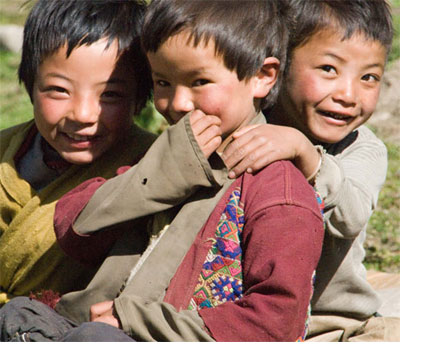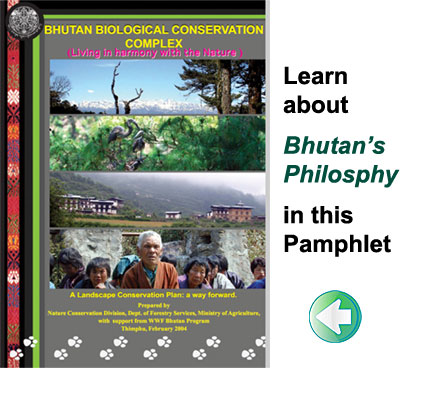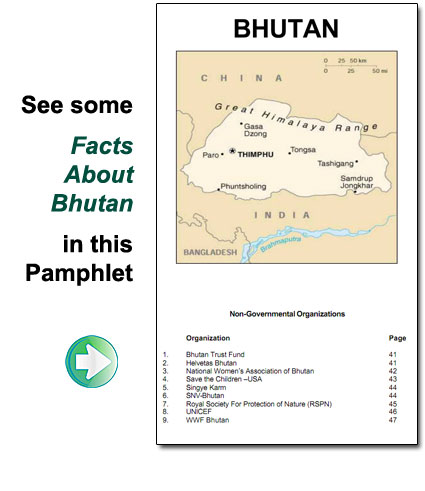Conservation in Bhutan
 DSF’s commitment to Bhutanese environmental protection and indigenous culture stems from the recognition that the country has managed to create one of the greatest blueprints for successful conservation anywhere in the world, with a protected network encompassing over 28% of this important Buddhist nation in an eastern Himalayan hotspot. In the 1970s the Fourth King, Jigme Singye Wangchuck, established a constitutional precedent by which at least 60% of all primary forest canopy in the country would remain inviolate. To date, more than 70% of Bhutan’s native flora and fauna remains pristine.
DSF’s commitment to Bhutanese environmental protection and indigenous culture stems from the recognition that the country has managed to create one of the greatest blueprints for successful conservation anywhere in the world, with a protected network encompassing over 28% of this important Buddhist nation in an eastern Himalayan hotspot. In the 1970s the Fourth King, Jigme Singye Wangchuck, established a constitutional precedent by which at least 60% of all primary forest canopy in the country would remain inviolate. To date, more than 70% of Bhutan’s native flora and fauna remains pristine.
The former director and founder of the country’s National Biodiversity Centre, located in the hills above the nation’s capital, Dr. Ugyen Tshewang, is a Dancing Star Foundation Research Fellow. He is the new Governor (Dzongkag) of the most eastern province, Trashi Yangste. Dr. Ugyen Tshewang’s outstanding contribution to preserving the biological heritage of Bhutan and the Eastern Himalayas sets an impressive example for conservation worldwide. A scientist, animal protection advocate and global ecologist, Dr. Ugyen Tshewang implemented a comprehensive gene bank for preserving the rare native species of the country, oversaw the national herbarium and sustains major work with respect to the country’s national parks, protected areas and biological corridors. Recently, Dr. Ugyen Tshewang was also charged with overseeing the nation’s Biodiversity Action Plan, under the Convention on Biological Diversity.
 DSF’s President, Dr. Michael Tobias, was the single international consultant as part of the BAP 2009 Technical Group for Bhutan’s third five-year blueprint for conservation in the country as stipulated by the United Nations Convention on Biological Diversity. The book, Biodiversity Action Plan 2009, was published under the auspices of the Ministry of Agriculture, Royal Government of Bhutan, in Thimphu during December, 2009, with funding by the UNDP (United Nations Development Programme).
DSF’s President, Dr. Michael Tobias, was the single international consultant as part of the BAP 2009 Technical Group for Bhutan’s third five-year blueprint for conservation in the country as stipulated by the United Nations Convention on Biological Diversity. The book, Biodiversity Action Plan 2009, was published under the auspices of the Ministry of Agriculture, Royal Government of Bhutan, in Thimphu during December, 2009, with funding by the UNDP (United Nations Development Programme).
Bhutan is the last chapter in DSF’s book, Sanctuary, in which the authors document the biodiversity and indigenous culture of Bhutan’s ninth and one of the most recently protected areas in the inaccessible far east of the country: the Sakteng Wildlife Sanctuary. Her Majesty, Ashi Dorji Wangmo Wangchuck, Queen of the Fourth King (Druk Gyalpo) of Bhutan, and Founder of the Tarayana Foundation, kindly authored the Foreword to Sanctuary.
For more information:
> Tarayana Foundation, a non-profit working to uplift and enhance the lives of vulnerable individuals and communities in Bhutan
> New Botanic Garden for Bhutan
> Bhutan Section of the World Wildlife Fund organization
> Royal Society for the
Protection and Care of Animals
> Royal Society for
Protection of Nature
 Bhutanese Hazelnut Project: Agro-‐Ecological/Sustainability Initiative in the Eastern Himalayas
Bhutanese Hazelnut Project: Agro-‐Ecological/Sustainability Initiative in the Eastern Himalayas
DSF has helped facilitate a major new project for Bhutan’s farmers through consultation assistance with key leaders throughout the government, particularly the Ministry of Agriculture, at the request of Mr. Daniel Spitzer, head of the Hazelnut Project and one of the world’s leading sustainability/business experts (as well as a Tibetologist), and his chief scientist, Dr. Andrew Watson, one of the foremost crop specialists in the world.
Learn about the project:
> Happiness and Hazelnuts: Daniel Spitzer digs into Bhutan’s soil to make a profit and sustain livelihoods
